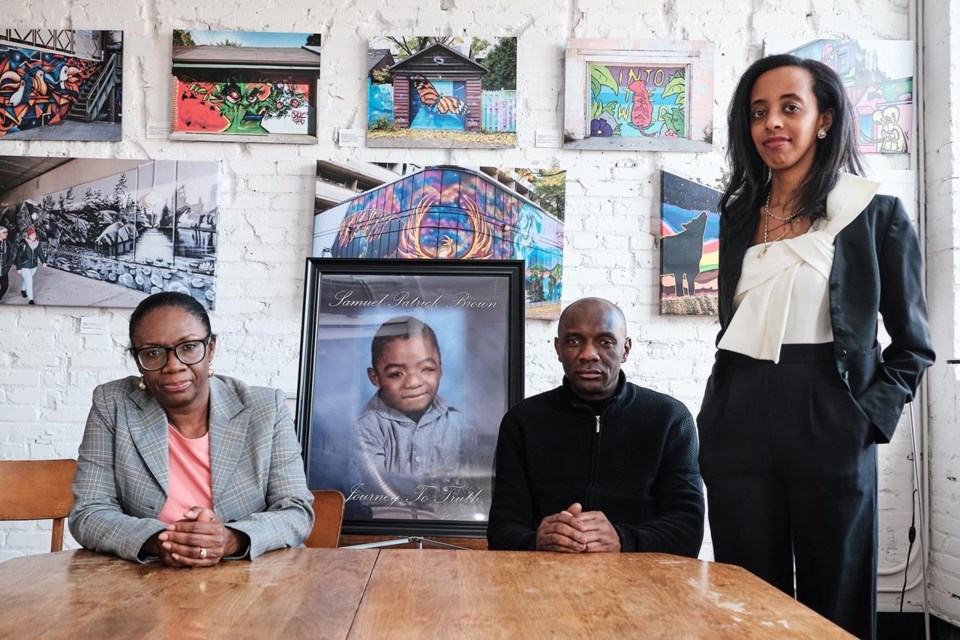Overnight staff at an Ontario school for blind children were shocked to find a disabled teen unresponsive on the morning of his death after routinely checking on him throughout the night, a coroner's inquest heard Wednesday.
Student support staff working at W. Ross Macdonald School between Feb. 8 and Feb. 9, 2018, testified that they had been checking on Samuel Brown at half-hour intervals all night and kept a close eye on him, given he appeared to have cold symptoms the evening before.
Stephanie Rymon-Lipinski, a former student support counsellor at the school, said it was only when she went into Brown's room at 6 a.m. to change his diaper that staff noticed the teen wasn't breathing.
"We started talking to him and moving him into position to be able to change him and that's when we realized that he was not responding," she told the inquest on Wednesday. "We were just in shock, we didn't know what to think."
Brown, who was born with a genetic condition that left him blind, deaf and non-verbal, died that morning while lodging at the Brantford-Ont. school, which serves as the province's dedicated school for the blind and deafblind.
He was 18 when he died after spending weekdays at the school since he was four years old.
The inquest that began this week is exploring the circumstances around Brown's death. His family has said he was in good health the weekend before he died and said medical experts disagreed about what led to his death.
Less than 12 hours passed between the time the family received a phone call indicating their son was slightly unwell and when Brown was declared dead, his mother testified earlier.
Before finding him unresponsive, Rymon-Lipinski reported that Brown appeared "congested" and had a runny nose, but that was not out of the norm for the teen or cause for alarm. She said she did not seek a hospital visit or call Brown's family during the night because he appeared stable and she didn't interpret any emergency situation.
"I don't think we deemed any necessity to do that during that time as he was sleeping," she said.
The inquest also heard that there were no nurses or medical staff available overnight at the school once their student health centre – which diagnosed Brown with a slight fever that evening, gave him Tylenol and cleared him to go back to his residence bed – closed at 11 p.m.
Dianne Harris, a support staff team leader at the school, testified that she had taken Brown's body temperature around 1 a.m. and it was 36.7 C – within the normal range.
"He looked comfortable, he looked like I'd seen him many, many times ... he looked content," said Harris. "He didn't have a fever anymore, so I thought he was just recovering from a cold."
When Rymon-Lipinski discovered Brown unresponsive, she called for Harris, who tried to shake him awake. "His body felt warm," Harris recalled.
Harris called 911 then returned to assist with CPR once they determined Brown had no pulse. Brantford firefighters and paramedics arrived and took Brown to hospital, where he was declared dead.
The inquest previously heard that Brown had difficulty swallowing and had hospital admissions as a child for aspiration, which is when food or liquid enters one's airways. As a result, most of his food had to be pureed and he had an additional risk of developing pneumonia, which he had been admitted to hospital for in the past.
"We thought he had a cold. We didn't think it was as serious as what it ended up being," Harris testified, noting support staff are not medical professionals who could have recognized apparent or non-apparent signs of pneumonia specifically, and they were not informed of Brown's history of infection.
The school now has a strict policy that students be sent home if they are feeling unwell rather than staying overnight, Harris added.
The Browns have said the investigating coroner produced a report saying their son had died of natural causes, while an autopsy report concluded he died of pneumonia.
Shay Martin, a nurse who evaluated Brown at the student health centre the evening before he died, testified that she noted nothing abnormal about his lungs, breathing rate or behaviour.
She did note his "shallow" breathing, as well as a bit of clear nasal discharge and some phlegm in his throat, but nothing else that would have warranted higher medical intervention.
He was not exhibiting any tell-tale signs of pneumonia like coughing or extremely high fever, she added.
Martin said she doesn't believe support staff being informed of his previous pneumonia diagnosis would have changed how they monitored Brown that night.
"They did a good job monitoring him and noting any changes in his condition," she said.
David Cameron, the coroner presiding over the inquest, told jurors Wednesday that the testimony indicated Brown either showed no signs of respiratory distress before he died early in the morning, or those symptoms were missed given his baseline medical conditions.
It's possible he developed respiratory issues overnight, Martin added, but that would be unlikely given the support staff's accounts of monitoring him.
The inquest is expected to last 10 days and hear from the pathologist who conducted a post-mortem examination of Brown's body, as well as an expert on medical ableism.
This report by The Canadian Press was first published Aug. 30, 2023.
Tyler Griffin, The Canadian Press

